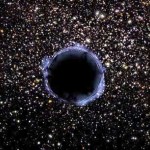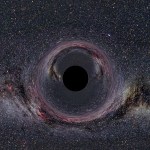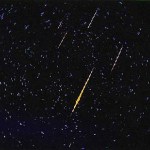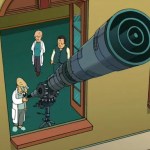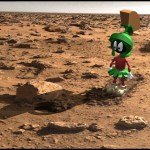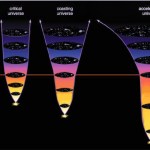
All that matters, in the real world, is that something is both massive and compact enough so that, within a certain radius, light cannot escape from it. That is the astrophysical definition of a black hole. -me
We've been talking about black holes a lot recently, and with good reason. They're fun to think about. These objects that collect matter, energy, light, and anything else that dares to cross its event horizon. It's only natural to ask what might lie beneath that dark area that no light ever escapes from.
Image credit: mondolithic.com.
In 1916, everyone assumed that whatever happened…
The cradle rocks above an abyss, and common sense tells us that our existence is but a brief crack of light between two eternities of darkness. -Vladimir Nabokov
Last Friday, I posed a question to you, and you kindly responded by voting as to whether, when you crossed the event horizon of a black hole, the lights would stay on or go off. The results so far?
What do I have to say? Good for you! Just because no light gets out doesn't mean that you can't see the light that comes in! When you're in your spaceship, very few things matter.
You could be in a strong gravitational field, like exists…
He that hath a beard is more than a youth, and he that hath no beard is less than a man. -Shakespeare
Far be it from me to take advice from Shakespeare, though. I prefer my advice from bluegrass musicians. If you want beards, you can't do much better than Jerry Garcia and David Grisman. Here's their version (along with Tony Rice) of House of the Rising Sun, which may be the best version of this song I've ever heard. By a lot.
Why the talk about beards? Well, many of you participated in my charity challenge and got me to shave my head. That worked so well as a motivator that I decided to…
Black holes have come up a couple of times this week, and I've always wondered something. When you fall into a black hole, all sorts of strange things happen.
The most well-known one is that nothing -- not even light -- can ever escape once it falls in. Well, my question is, if you fell in to a black hole, as you crossed the event horizon in your sturdy, well-lit spaceship, would the lights stay on or would they go out as you crossed into the black hole? (Ignoring the tidal forces that would rip you and the spaceship apart.)
In other words, you've read the first 1497 pages of the Count of…
Why it is that of all the billions and billions of strange objects in the Cosmos -- novas, quasars, pulsars, black holes -- you are beyond doubt the strangest? -Walker Percy
When you watch someone fall into a black hole, what you actually see is pretty surprising. You see, a black hole's gravity distorts the space around it, and it does so without providing any light of its own, giving you a unique perspective on the Universe.
Well, if you watch someone else fall in, you'd see them approach the black hole normally, and then the bizarreness starts. As they go deeper and deeper into the…
In the comments on one of my posts, someone pointed me towards Stephen Crothers, who gives the following argument (in a nutshell) as to why black holes cannot possibly exist:
General Relativity is our theory of gravity, which relates the curvature of space to the gravitational acceleration of objects.
This theory only works in certain regimes; it breaks down at the point of singularities.
A black hole, as predicted by Schwarzschild, is a singularity.
Therefore, since singularities are forbidden by General Relativity, there is no reason to think that black holes exist.
(You can watch his…
Some meteor showers are spectacular, while most are mundane. If you sit around during a typical shower, you might see anywhere from 50 to 100 meteors an hour, if the Moon isn't out.
If you take a time-lapse photograph and look for meteors, you will, sometimes, get a great view of what's going on. Although it isn't immediately clear what's a meteor and what's a passing satellite or airplane, you can tell them apart in this video by looking for the "instant" streaks, which are meteors, versus the ones that streak for many frames, which are satellites or aircrafts.
Well, the Leonids peak…
I thought I should consult you first before I went ahead with my plan to destroy the Moon. -Greg Angelone, via The Straight Dope
Last week, scientists from LCROSS announced that they had detected "a buttload" of water on the Moon. Let's go over what happened and what it means.
The Moon is very different from Earth. It has no atmosphere (literally, less than one atom thick), day-and-night lasts for two weeks apiece, and the temperature extremes are horrifically severe. But one of the biggest differences? Whereas the Earth is tilted at 23.5 degrees as it goes around the Sun, the Moon is tilted…
But I want you to know something... you and me, it's not gonna be a one-way street. 'Cause I don't believe in one-way streets. Not between people, and not while I'm driving. So, here's some advice I wish I woulda got when I was your age: Live every week like it's Shark Week. -Tracy Jordan, 30 Rock
And, much like Tracy, the song for you this week is simple, sweet, and good-hearted. Enjoy an old classic, Just the Two of Us by Grover Washington, Jr., and Bill Withers.
Many of you have asked about whether there were any good science programs on television, and I have found one for you. Starting…
Can you touch your toes? Seems like an easy thing to do for those of us who have the flexibility.
Now, here's the challenge. Stand with your back and your heels pressed up against a wall, and now try to touch your toes.
You can't do it! Not without putting your hands down on the floor, you can't. There's a super-simple reason for this: center-of-mass.
For human beings, your center-of-mass is somewhere in your abdomen. It's lower down for women than men, but in the abdomen region for everyone. When you typically bend down to touch your toes, you'll notice that the upper part of your body…
Professor Hubert Farnsworth: I'm sorry, Fry, but astronomers renamed Uranus in 2620 to end that stupid joke once and for all.
Fry: Oh. What's it called now?
Professor Hubert Farnsworth: Urrectum. Here, let me locate it for you.
Fry: No, no, I, I think I'll just smell around a bit over here.
Too bad that Futurama's smell-o-scope doesn't actually exists.
Why is it too bad? Because space is filled with many different types of atoms, including Carbon, Nitrogen, Oxygen, and Hydrogen: the elements essential to terrestrial life. In space, these sometimes appear in isolation, they sometimes appear…
Though the Sun is gone, I have a light. -Kurt Cobain
Last time we visited dark energy, we discussed its initial discovery. This came about from the fact that supernovae observed with a certain redshift (i.e., moving away from us) appear to be systematically fainter than we were able to explain.
But we weren't satisfied with simply saying that there must be dark energy. We asked a lot of critical questions about why these supernovae might appear so faint.
First off, we asked the question, "Could these supernovae from far away be different than the type Ia supernovae we have today?"…
Yesterday, I talked about why we should look for a history of life on Mars, and had an article for SEED magazine to that effect. After all, we've made some recent geological finds that are surefire indicators of past liquid water on Mars, and possible indicators of past life.
While most of the article was about Mars' history as a planet and the argument that in the past, it was much more Earth-like than it is today, I had one sentence that appears to have touched off a firestorm in the comments:
I don't know whether there was life on Mars or not, but based on what I know about abiogenesis…
The Mars Polar Lander cost the average American the price of half a cheeseburger. A human lander would cost the average American more -- perhaps even ten cheeseburgers! So be it. That is no great sacrifice.
-JONAH GOLDBERG, National Review Online, May 3, 2000
This week, Seed Magazine is doing a special on extraterrestrial life in the Universe. They cover a lot of ground, including whether life would necessarily look like life on Earth, where the likely places are to find it, and endeavors towards that end.
And they approached me to write an article for them about Mars. An excerpt is below:…
We've got an interesting contrast this weekend between the music and the fun stuff. I'm listening to Ray Lamontagne, a wonderful acoustic guitarist and singer/songwriter. The first song I heard by him was his version of Gnarls Barkley's Crazy, and I was instantly hooked. But the heartbreak of his song "Shelter" really got to me, and so I present a live version of it, followed by "Hold you in my arms," to you below.
And I think that, along with something deep and powerful like these songs are for me, you need something fun, happy, and amusing to balance it.
So, if you haven't heard of…
It's hard to believe that until 1929, we were pretty sure that the Universe consisted entirely of our galaxy, and everything else was inside of us.
Hard to believe that you can look at something like this and not think it was another galaxy like our own, isn't it?
Yet when you look in the visible light -- which is all they knew how to do back then -- this is what the pinwheel galaxy (above) looks like through a modern advanced amateur telescope.
Is it really so clear to your naked eye that this image is so different from the one below?
Believe it or not, this image is of a planetary nebula…
Last time, we talked about the discovery of dark energy. How did it happen? Well, there are certain kinds of Supernovae, type Ia supernovae, that are practically identical to one another all across the Universe. In fact, we had one happen in our own galaxy in 1572; it outshone everything besides the Moon in the night sky for weeks.
How do type Ia supernovae work? Many solar systems out there are like our own, with one star dominating the system. Others, however, have two or more stars present in the system. Stars up to about four times the mass of our Sun, when they finish burning their…
Once you can accept the Universe as being something expanding into an infinite nothing which is something, wearing stripes with plaid is easy. -A. Einstein
But accepting the expansion of the Universe is easy compared to accepting the existence of dark energy. Why -- and how -- is there some mysterious property inherent to space that prevents the expansion rate from dropping to zero? Why is the expansion rate as large as it is today? Why, of the four options we can reasonably conceive of, is the Universe obeying this "accelerating" picture below?
The why and how are questions that we do not…
My heroes had the heart to lose their lives out on a limb,
And all I remember is thinking, "I want to be like them!" --Gnarls Barkley
And here's a new discovery (to me): the Violent Femmes version to help you through your post-Halloween Monday:
The Ares I-X rocket has been all over the news recently. I'm not sure that the news coverage sufficiently showcases how impressive this rocket actually is. Sure, you've all seen a picture of the rocket on the launchpad.
Yes, the rocket has a long history. Yes, it's nearly twice as high as the space shuttle (at a whopping 327 feet, or 99.7 meters).…
Here is your king's scepter, and here is your kingdom, with the scorpion, the cobra, and the lizard for subjects. Free them if you will. Leave the slaves to me. --Ramses, in The Ten Commandments
This year, I went as Pharaoh Ramses II, as played by Yul Brynner (above and below).
Well, this is my take on it!
Even Moses couldn't resist having his picture taken with me.
So Happy Halloween to all of you, and I hope you enjoy the new profile photo!
What do you all say? Should we have a Halloween Costume Contest next year?



